2021 Annual Report:
Lilly Endowment launched its Enhancing Opportunity in Indianapolis initiative to help people like LeAnn Thorne and Lamont Harvey, who were stalled at the bottom of the pay scale in the healthcare field. And Herbert White, who was rejoining the workforce after 17 years in prison. And Kelly DeWald, a single mom who now can afford a home for herself and her three children.
Through the initiative, the Endowment issued a broad invitation to human service agencies, community centers, employers, faith-based groups and other community organizations to imagine how funding could help improve the livelihoods of individuals and families facing complex challenges associated with poverty and financial insecurity. It is daunting work in Indianapolis, where some 20 percent of residents live in poverty and another 20 percent live close to it.
In March 2021 the Endowment made nearly $94 million in grants to 28 organizations that are working to help residents break cycles of poverty and help employers create more jobs that pay a living wage and lead to strong careers.
“Lilly Endowment’s initiative is unique for its truly multi-dimensional approach,” says Mark Muro, senior fellow at Brookings Metro, a division of the Brookings Institution. Researchers there work to help every kind of U.S. community become prosperous, just and resilient.
Projects that the Endowment is supporting, Muro says, are addressing the need for more jobs that provide a living wage, benefits and potential career advancement—jobs that Brookings describes as “good jobs.” The efforts go further, however, by helping individuals find those jobs and be successful in them. Muro’s research found that in 2018, the Indianapolis region had a deficit of 120,000 good or promising jobs.
But, he adds, it’s more than a matter of jobs and skills. Individuals who struggle to find employment and build careers face many challenges—housing insecurity, limited access to good childcare, and the need for mentoring and career networking, among them.
“What’s impressive here is the overall philanthropic drive to find the best, truly multi-dimensional holistic approaches to take on a whole range of problems,” Muro says.
Here’s what some of the grant recipients are doing to tackle the persistent challenges of poverty and financial insecurity in Marion County.
Transforming a Community
 The main campus of Eastern Star Church is in the Arlington Woods neighborhood on Indianapolis’ east side, an area where 38.2 percent of the residents live at or below the poverty line (compared with 21 percent of all Marion County residents) and household income for residents is $25,292 (versus $42,378 for Marion County residents). For years, residents have watched banks and grocery stores abandon the area, and they have watched the decline of safe, affordable housing options.
The main campus of Eastern Star Church is in the Arlington Woods neighborhood on Indianapolis’ east side, an area where 38.2 percent of the residents live at or below the poverty line (compared with 21 percent of all Marion County residents) and household income for residents is $25,292 (versus $42,378 for Marion County residents). For years, residents have watched banks and grocery stores abandon the area, and they have watched the decline of safe, affordable housing options.
“For some reason, over the years, between Emerson and Arlington avenues, it seems that there had been investment, even enterprise zones, developed. But this pocket of the community had been left out,” says Anthony Murdock, Eastern Star Church’s executive pastor.
“The church felt that if there’s going to be investment and transformation in the community, we were going to have to start it.”
In 2017, congregation leaders launched the ROCK Initiative (Renewing Our Community for the Kingdom), establishing it with these four goals:
- Build a sense of community among the people who live and work in the neighborhood.
- Enhance the range of housing options available within a one-mile radius of the church.
- Grow the overall financial security of residents living in the neighborhood.
- Enhance both formal and informal educational opportunities available for neighborhood residents.
“It is our commitment to practice love and to provide service to the least, the lonely and the left out,” says Leigh Riley Evans, the church’s director of community development. “As explained in the scripture (Matthew 25:40): ‘Whatever you did for one of the least of these brothers and sisters of mine, you did for me.’”
With support from an $8 million Enhancing Opportunity grant, the church is completing construction of a 60,000-square-foot ROCK Community Center for Youth & Children, which opens in 2022. The center will offer services “designed to enhance social capital and strengthen economic, educational and workforce development opportunities” in collaboration with K-12 and higher education institutions and local employers.
The building is divided into three wings—with separate entrances for elementary, middle and high school students for after-school and out-of-school programming. Designed to take advantage of natural light, the building has windows that open and areas for parents to watch their kids learning and playing. There’s space where community groups can gather and a multi-purpose gym for basketball games, town hall meetings, speaker series and other events for up to 400 people.
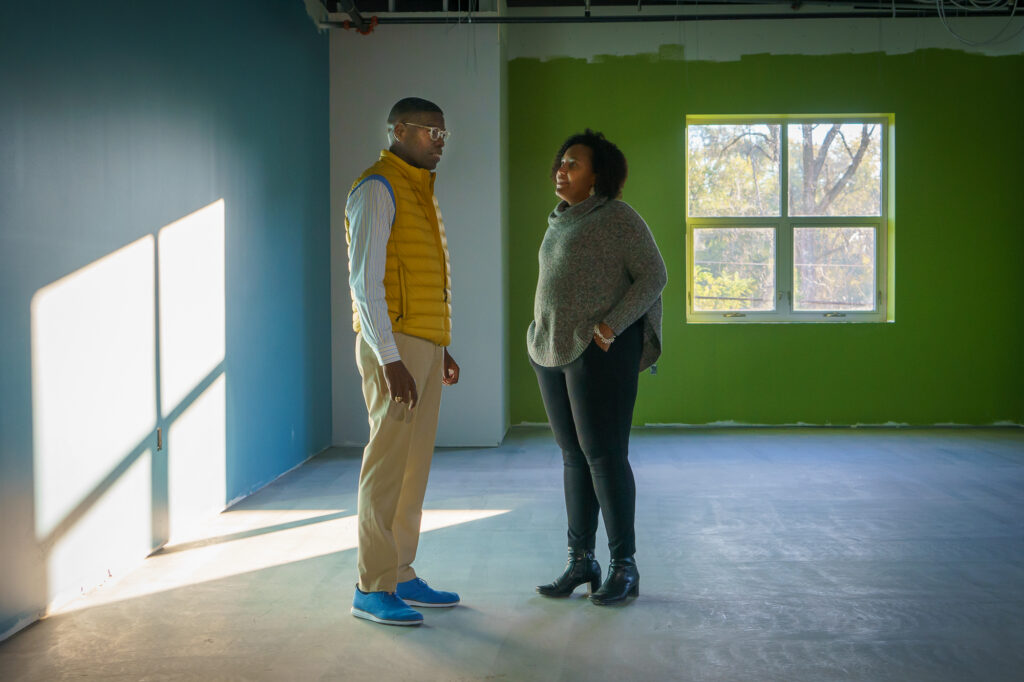
“We want it to be accessible and welcoming,” Murdock says. “This is a changing community.”
Leading a tour of the area, Murdock and Evans show off some of the changes in Arlington Woods. They point to two schools—the IPS Innovation K-6 Sankofa School of Success, and Rooted School Indy, a charter high school—that are bringing innovation to the neighborhood.
And along 30th Street, adjacent to the church, are two multi-story apartment buildings containing a total of 45 rental properties available for $750 a month or less. On street level, there is a branch of the Financial Health Federal Credit Union and the ROCK Fresh Market, a small grocery store (see below) staffed by neighborhood volunteers that sells, among other things, produce grown at the ROCK Urban Farm.
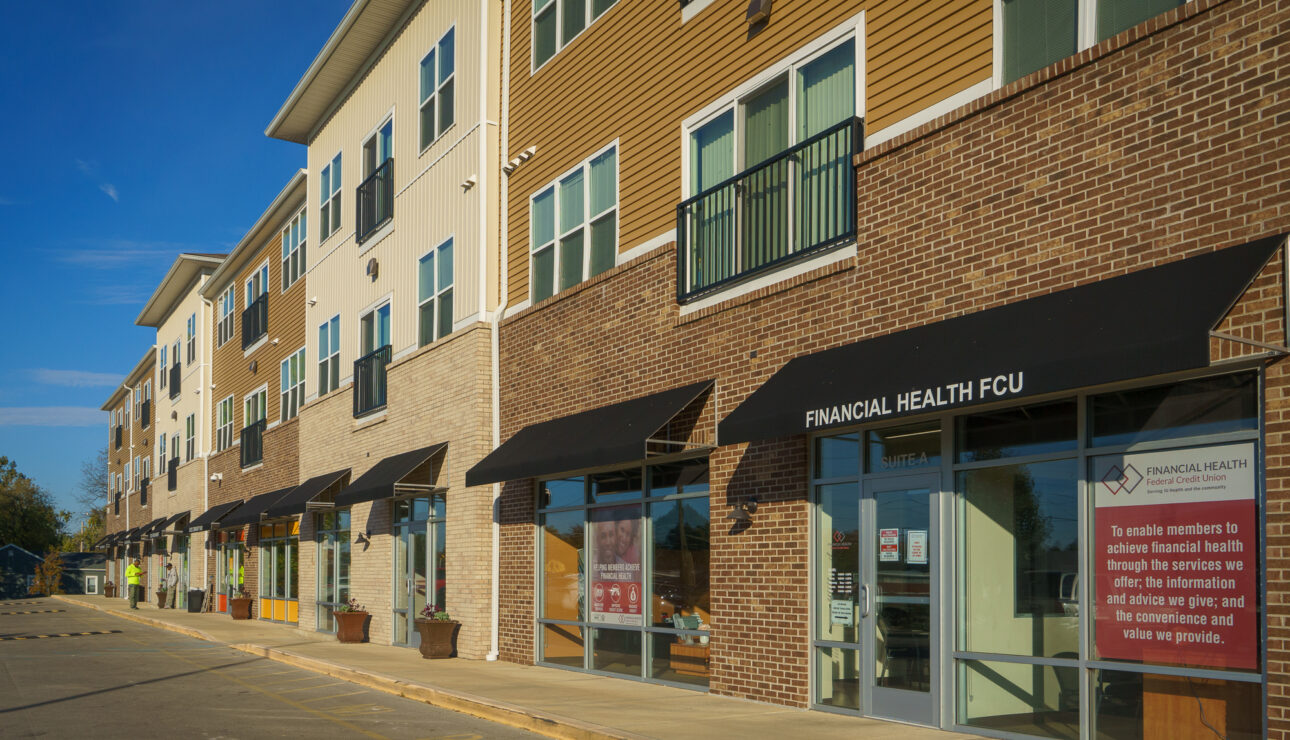
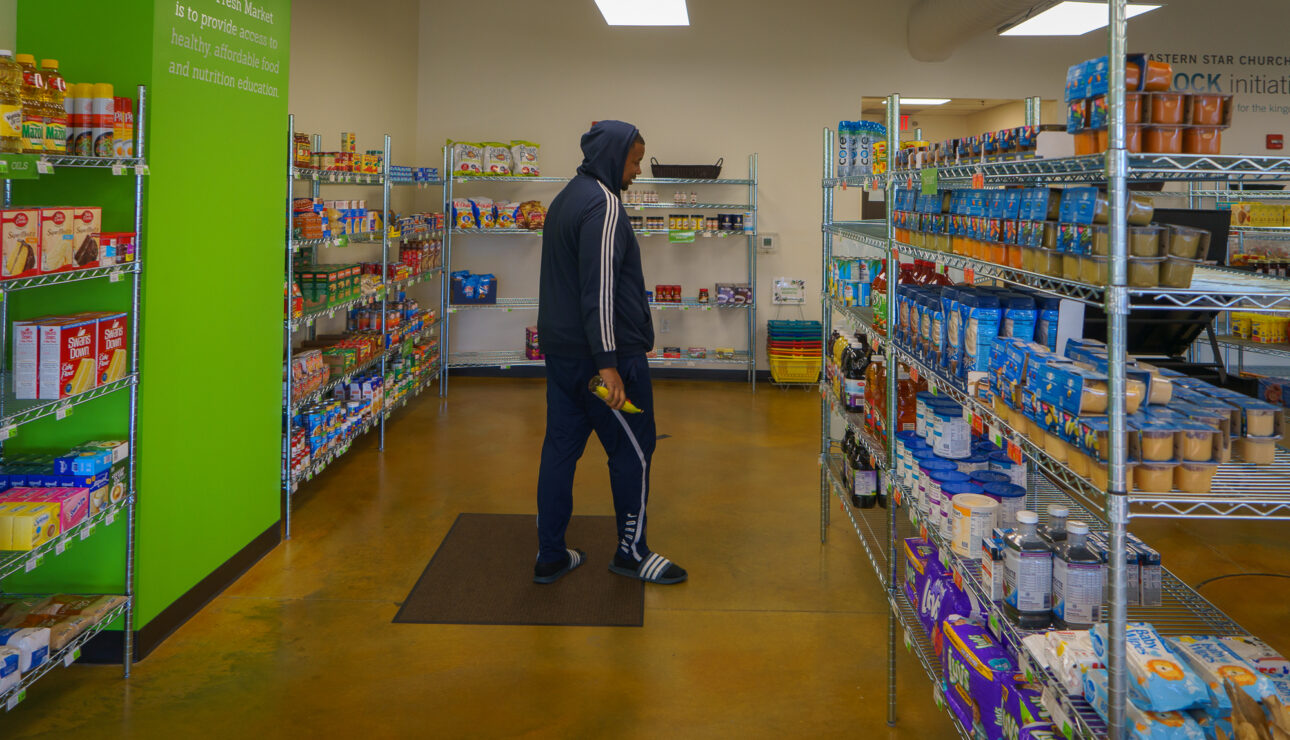
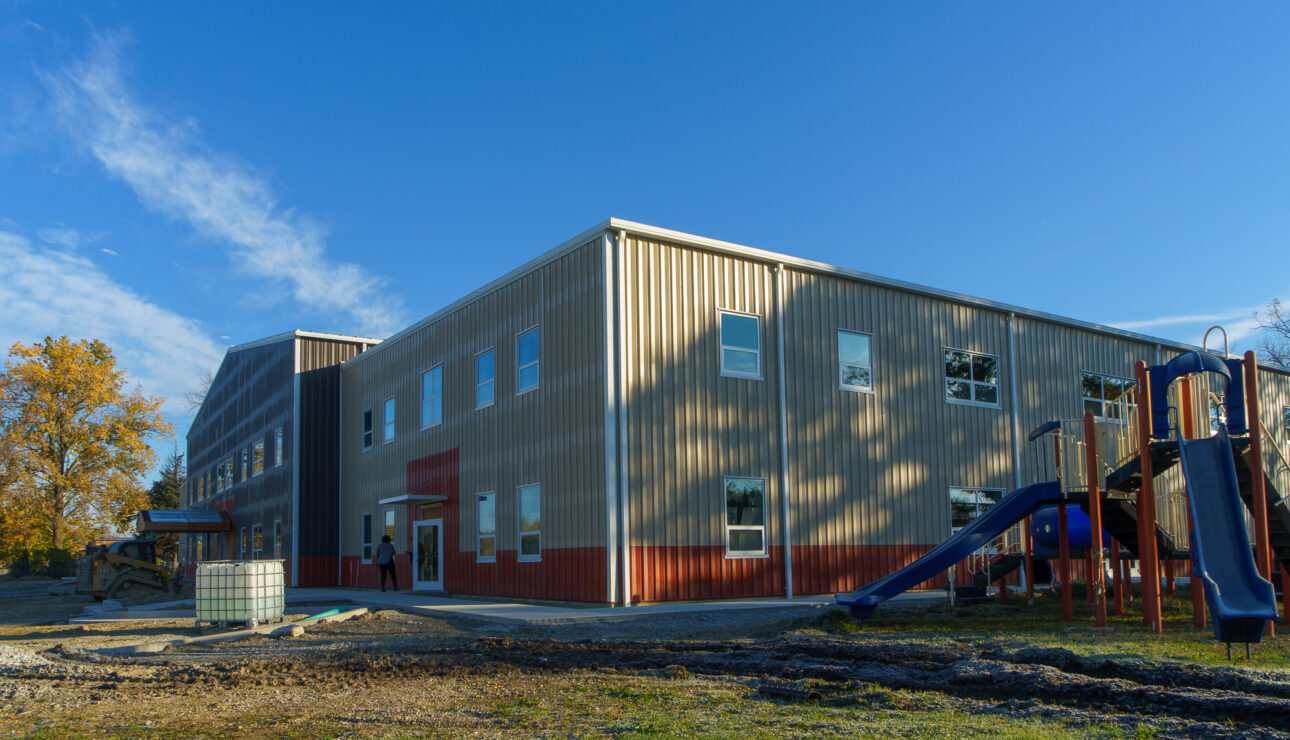
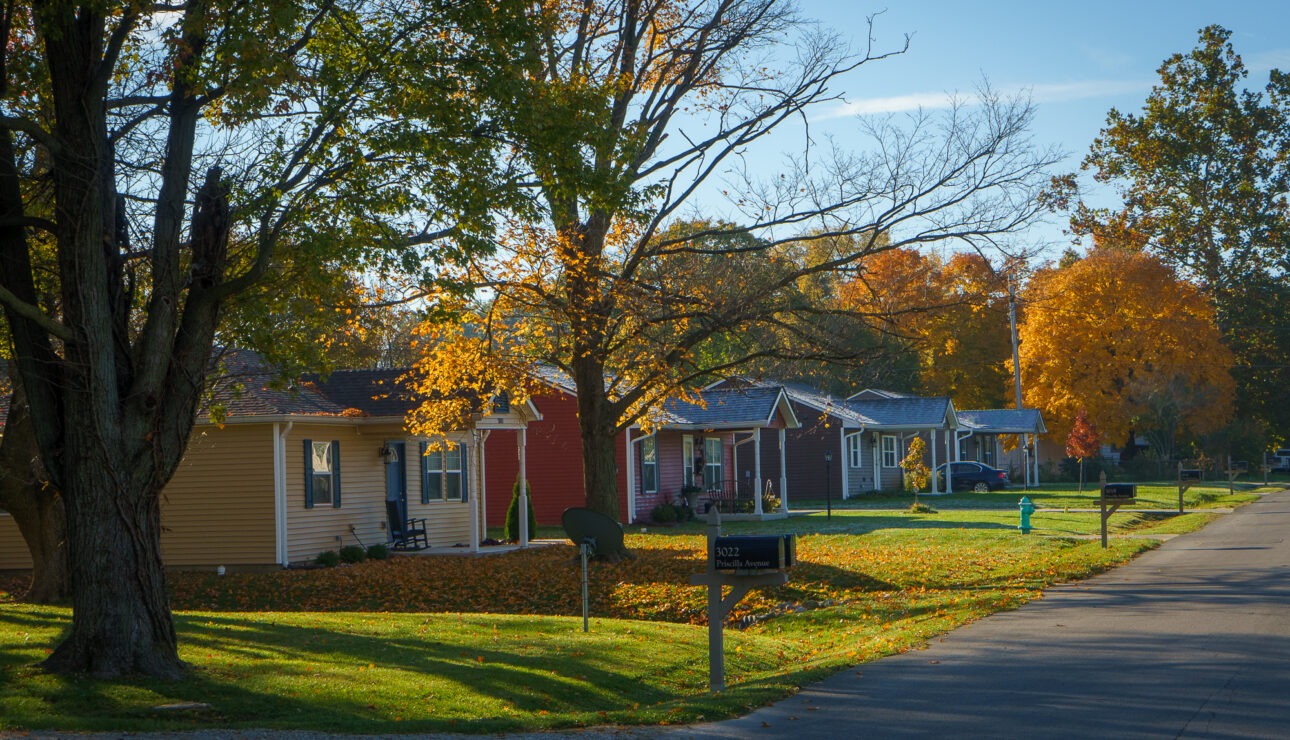
There’s a business-incubation space called the ROCK Community Hub, a barbershop (see above) and a satellite office of the Indianapolis Neighborhood Housing Partnership. Known as INHP, the organization supports renters and first-time homebuyers looking for affordable housing and is working with Eastern Star Church and six other Enhancing Opportunity in Indianapolis grantees that are helping individuals and families attain housing security. On the opposite side of the church is Priscilla Avenue (above). Murdock calls the street “our jewel.” It contains 13 houses the church either bought and renovated or built with Habitat for Humanity of Greater Indianapolis or constructed themselves. One of those houses now belongs to Kelly DeWald, a mother of three children.
DeWald found the ROCK initiative through a Google search. In August 2018, she and Jaylen, now 18; Kalora, 15; and Logan, 11, moved from Emporia, Kansas, into one of the apartment buildings Eastern Star had built. In April 2020, DeWald, who works for a company that rents storage sheds, bought one of the houses on Priscilla Avenue, a comfortable three-bedroom, two-bathroom house with a “pretty awesome” back yard.
“It’s wonderful to have a brand-new house—something I never dreamed of,” says DeWald, who is not an Eastern Star member. “But I wanted to be a part of what they’re doing in the community. That was the biggest draw.”
“Sometimes my biggest frustration with churches is they live too much inside their church. The goal is to live outside your church. Eastern Star puts action behind their words.” —Kelly DeWald, Arlington Woods homeowner
Mentoring ‘Returning Citizens’
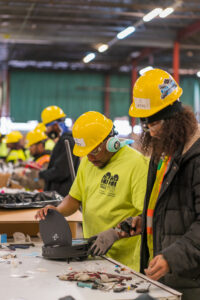 When individuals leave prison, they often lack the kind of employment that can help them make a successful transition, which is a leading predictor of recidivism. Since 2006, RecycleForce, an electronics-recycling employment social enterprise located near downtown Indianapolis, has given their clients whom they call “returning citizens,” an opportunity. RecycleForce President Gregg Keesling says the goal is to advance them from A (any job) to B (a better job) to C (a career).
When individuals leave prison, they often lack the kind of employment that can help them make a successful transition, which is a leading predictor of recidivism. Since 2006, RecycleForce, an electronics-recycling employment social enterprise located near downtown Indianapolis, has given their clients whom they call “returning citizens,” an opportunity. RecycleForce President Gregg Keesling says the goal is to advance them from A (any job) to B (a better job) to C (a career).
Its Enhancing Opportunity grant buys RecycleForce more time to get workers from A to B. That is, more time to help workers strengthen self-esteem, understand what leadership looks like at a worksite, and make the transition from daily life in prison to daily life back in their Indianapolis communities.
A visit to Trusted Mentors, a peer mentoring class at RecycleForce, provides some insight into what clients need to succeed. Group members discuss issues of trust. How people have made promises but haven’t followed through. How not having fathers may have influenced their view of the world. How breathing techniques can help them calm down and think rationally. The group setting is a place for them to vent, to process their lived experiences and to get support from each other.
Learning these human interaction skills takes time, RecycleForce chief operating officer Dustin Jones says. RecycleForce gets federal funding, but that only covers the cost of 120 days of support to help participants get used to showing up for work, doing the job and earning credentials to help them get a better job.
The Endowment’s grant is helping RecycleForce do more. Funding is enabling the organization to extend job training and to support wrap-around services, such as mental health care and support for stable housing. The goal is to help at least 600 participants get jobs that improve earning potential. In addition, RecycleForce wants to help at least 100 of these returning citizens attain supervisory and leadership skills through its peer-leadership program.
 RecycleForce works with individuals like Herbert White (left), who was released on Sept. 1, 2020, after serving 17 years in prison. Before beginning that sentence, he worked the night shift at a manufacturing warehouse in Mooresville, Ind. While incarcerated, he worked in a prison hospice, was certified in auto-body mechanics, filled commissary orders and clerked in the prison law library.
RecycleForce works with individuals like Herbert White (left), who was released on Sept. 1, 2020, after serving 17 years in prison. Before beginning that sentence, he worked the night shift at a manufacturing warehouse in Mooresville, Ind. While incarcerated, he worked in a prison hospice, was certified in auto-body mechanics, filled commissary orders and clerked in the prison law library.
White had skills. What he needed was opportunity. His parole officer helped him sign on with RecycleForce. He went through orientation on Sept. 19, 2020, and during the next year accumulated by his count 15 certificates in areas such as detecting radiation, handling freon and cleaning up hazardous chemicals, personal protective equipment usage and peer mentoring.
White wanted to stay at RecycleForce, but $11 an hour is the salary cap there. When ERI (Electronics Recyclers International) in Plainfield, Ind., offered him a job on the night shift dismantling flat screen televisions for $16 an hour, he had to go.
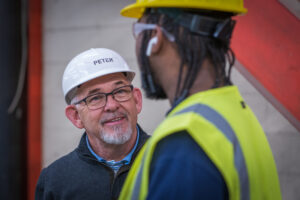 “It was wonderful to see the transition of Mr. White,” says Peter O’Scanaill (right), executive director of employment social enterprise at RecycleForce. “He went from feeling like ‘I want to stay here; I don’t want to leave the nest,’ to becoming more confident, more assertive.”
“It was wonderful to see the transition of Mr. White,” says Peter O’Scanaill (right), executive director of employment social enterprise at RecycleForce. “He went from feeling like ‘I want to stay here; I don’t want to leave the nest,’ to becoming more confident, more assertive.”
White says he had hoped to learn leadership at RecycleForce. He got that, and more.
“If you work the RecycleForce program properly, it will help you,” he says. “That means going all-in. It will give you the training and knowledge you need to get that better job.”
Or, as RecycleForce would say, the “C” or a career. In his first 104 days at ERI, White’s solid work ethic and skills helped him earn a promotion to environment health and safety supervisor, which pays $20 an hour.
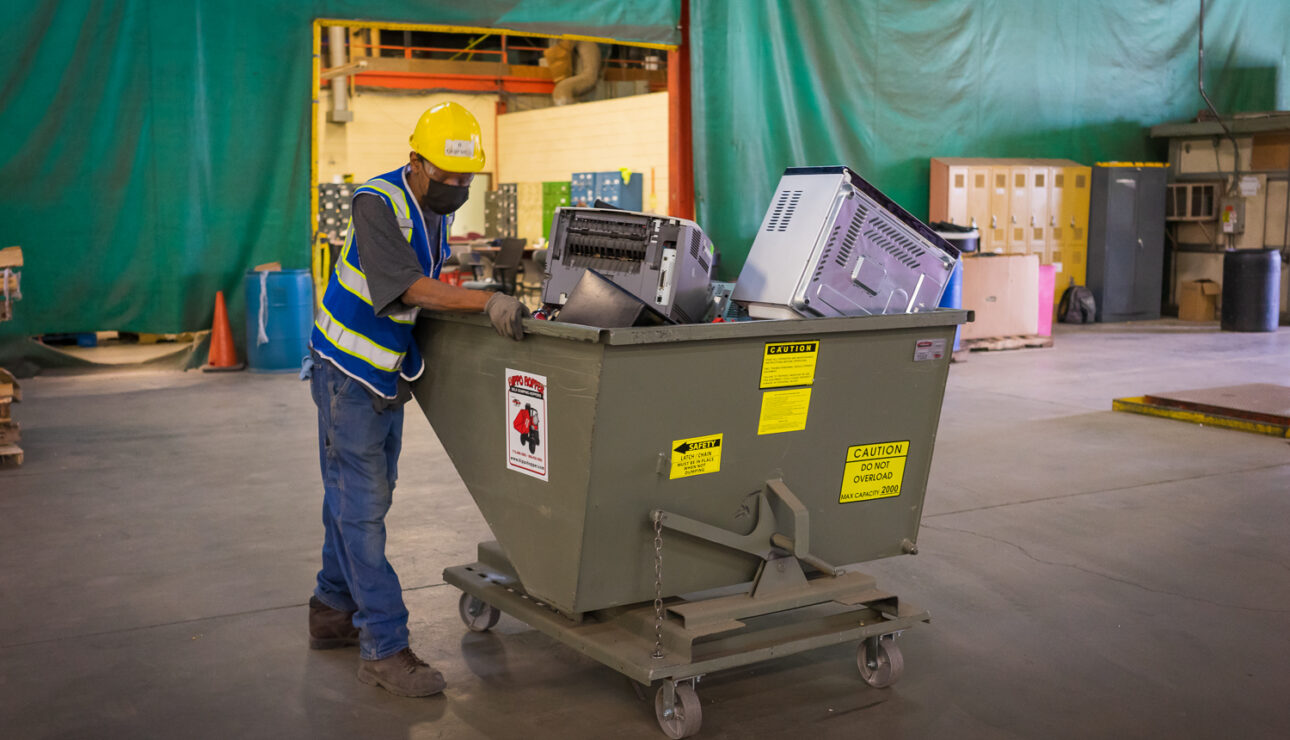
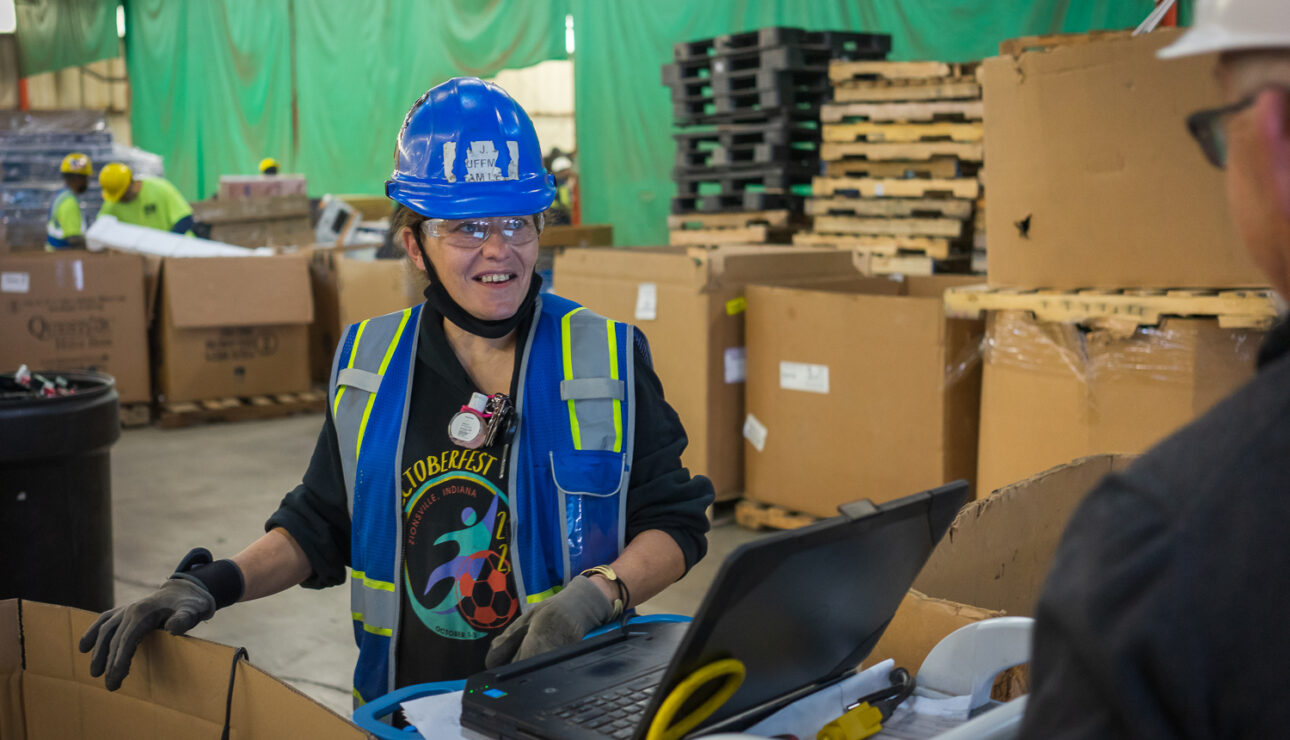

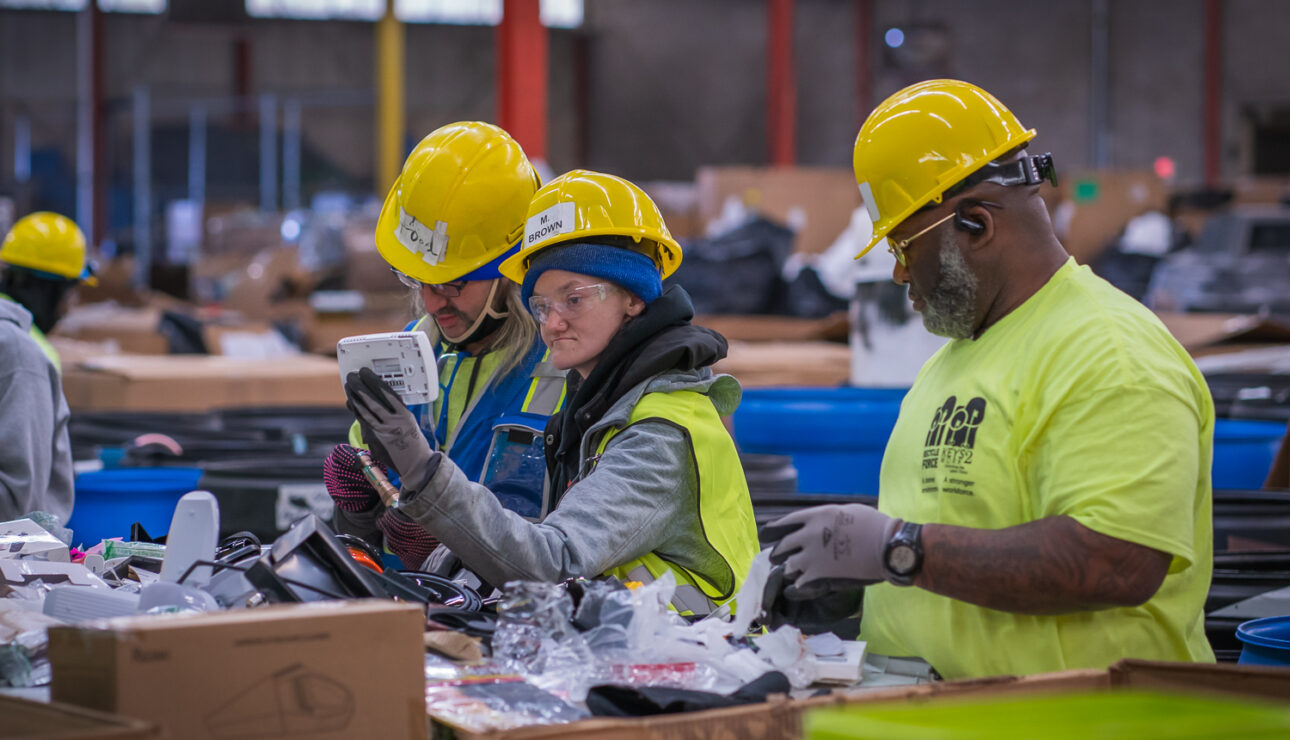
Opportunities to Turn Jobs Into Careers
IU Health’s central mission is to make individuals in Indiana healthier, and its definition of health includes financial stability—people being able to cover their basic needs and have good jobs with benefits. That’s the thinking behind the Mosaic Center for Work, Life and Learning, which is designed to improve opportunities for entry-level team members who work in areas such as food and nutrition and environmental services (maintenance), to grow its talent pipeline by offering opportunities to people who might want to work in healthcare, and to entice more young people to get into health-sciences careers.
Mosaic Center director Starla Hart says the goal of the program, which began two years ago, is to ramp up workers’ skills, getting them to $18 an hour with benefits as quickly as possible (IU Health’s minimum hourly wage is $16) and, ideally, to $25-$30 an hour and beyond.
The Endowment’s $8 million Enhancing Opportunity grant is enabling IU Health to establish a physical space for the center and to hire staff that includes career coaches, financial coaches and social workers. In addition to helping current employees advance their careers, Mosaic Center is developing partnerships with schools, community centers and other Indianapolis organizations to develop pipelines of new healthcare professionals.
Mosaic has shown early success with personnel already on the IU Health payroll. People like Lamont Harvey (below), an anesthesia assistant and anesthesia team lead at IU Methodist Hospital in Indianapolis. Today, Harvey is earning “high five figures” annually, but in 2006, he was working in environmental services (maintenance) making $8.59 an hour. His future seemed limited, until someone noticed his growth potential. He took advantage of additional education—which the hospital paid for—and certification, and moved into the sterile-processing department, where medical and surgical supplies and equipment are processed, stored and issued for patient care.
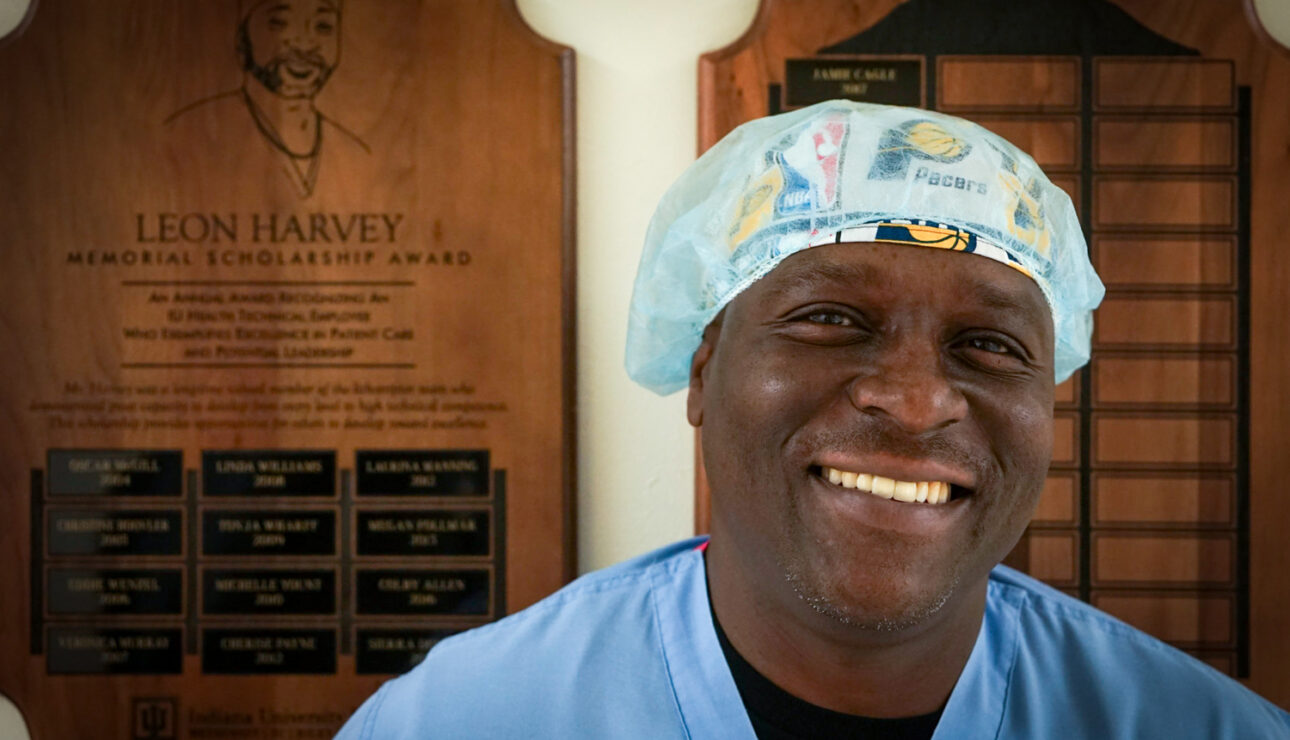
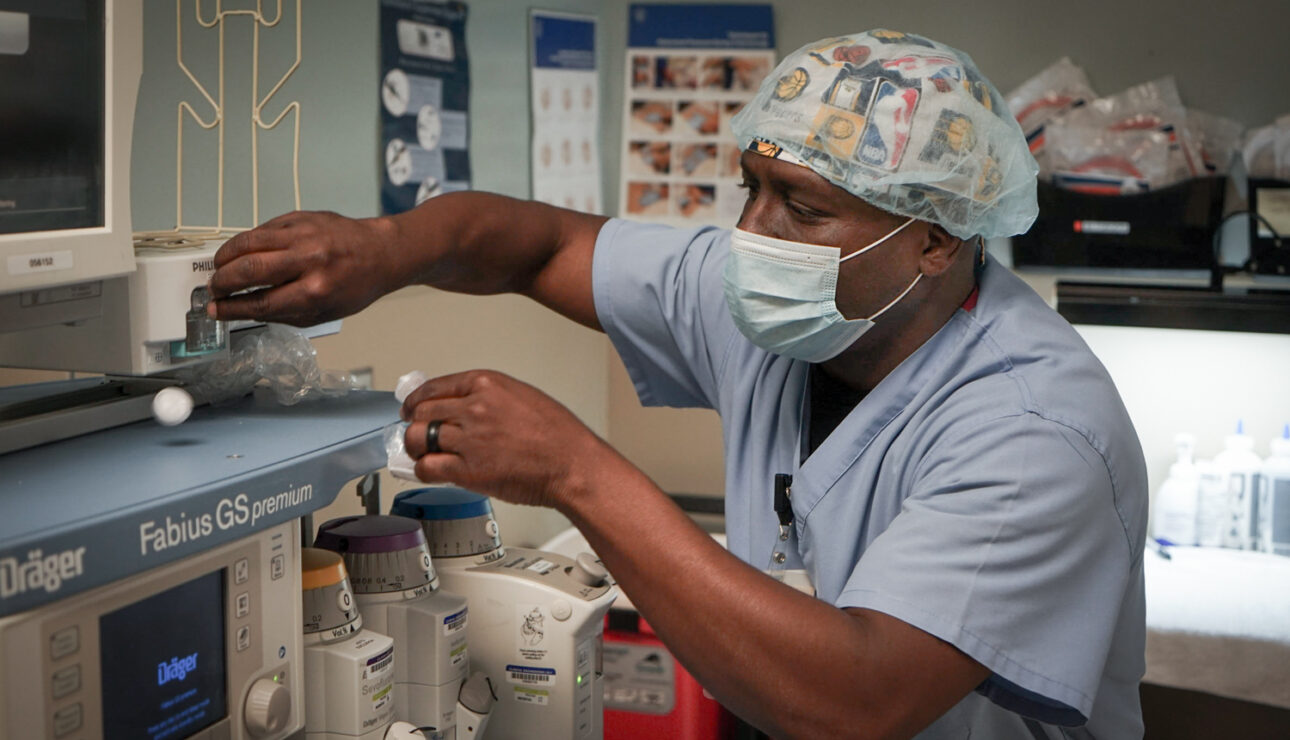
After five years, Harvey wanted to grow more. When a position opened in anesthesia, he was offered the opportunity to get more education and certification. With support from IU Health, Harvey earned three certifications that qualify him for increased responsibility within the hospital that help him keep the anesthesia department prepared for patient care. There’s no way that Harvey, the breadwinner for a family of four, could have paid for that training on his own.
“If the opportunity is there, then I’ll take it,” he says. “But without IU Health helping me with school, I don’t think that I would have even looked at it.”
Now, he’d like to be an ambassador for the program and speak to students thinking about participating in Mosaic Center programming.
“If they talk to someone who walks the walk, who’s come from the bare minimum and grown,” he says, “I think they would definitely take more heed.”
Mosaic Center helped Harvey move up. It also helped retain LeAnn Thorne, a certified clinical medical assistant for IU Health Multi-Specialty at IU Health West in Avon, Ind.
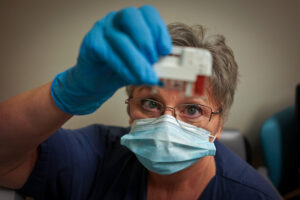 Thorne (left) started her career as an emergency medical technician but found when she moved from Fountain County, Indiana, to Indianapolis that she could make more money decorating cakes than she could as an EMT. So, she went through a program to become a medical assistant and in 1992 graduated at the top of her class.
Thorne (left) started her career as an emergency medical technician but found when she moved from Fountain County, Indiana, to Indianapolis that she could make more money decorating cakes than she could as an EMT. So, she went through a program to become a medical assistant and in 1992 graduated at the top of her class.
When IU Health started offering medical assistant certification through a Mosaic Center pilot project in 2017, Thorne jumped at the opportunity. The additional credential has opened opportunities for advancement, increased pay and additional responsibilities at work. She orders tests for patients, helps coordinate prescription refills, checks in patients, takes their vital signs, schedules lab work and calls patients to relay information from their doctors. She can’t make medical decisions, but she can expedite care.
“I try to be a warm, friendly face for IU Health,” she says. “Patients appreciate that they’re treated like people and not like numbers.”
Without Mosaic Center, Thorne says, she would be back at the lower end of the pay scale, “and I don’t know if I would still be here. I was getting tired of that and I might have left healthcare. It certainly kept me in the healthcare field and made my life better.”
Learn more about this initiative and its other grantees.
Related news:
- RecycleForce’s peer leadership program helps ex-offenders become leaders. Watch video on WRTV News.
- IU Health Foundation receives Lilly Endowment grant to support workforce development project in Near North Indianapolis. Read news release.
Grants made in 2021 help individuals and families facing complex and varied challenges associated with poverty make progress toward lasting economic self-sufficiency. Organizations proposed ideas for new projects or how to strengthen existing efforts that could:
- Help individuals seek and acquire good jobs (paying at least $18 an hour with healthcare benefits) or promising jobs.
- Address barriers to economic prosperity that disproportionately affect Black and Latino residents.
- Help children and youth be prepared for in-demand jobs and success in higher education.
- Focus on the needs of residents in high-poverty neighborhoods.
- Help residents who face challenges in addition to poverty – youth aging out of foster care, individuals with disabilities, members of immigrant communities with language barriers and individuals who are reentering their communities after incarceration.

